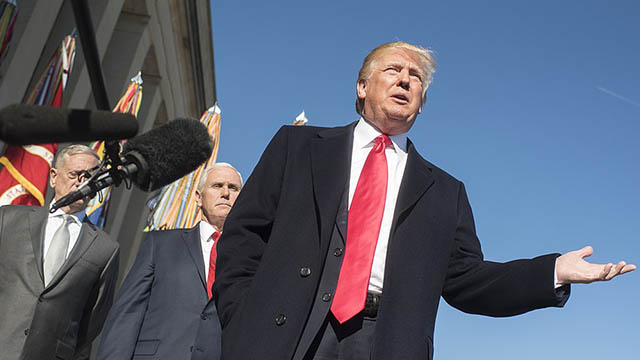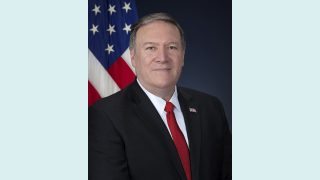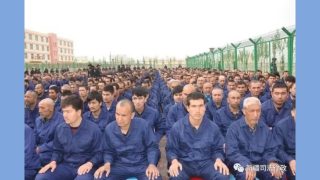It seems that the Department of the Treasury is stopping the direct way to hold tyrants accountable for their crimes in the Muslim region, and Democrats react.

by Marco Respinti
The US targeted sanctions against perpetrators of crimes regarding religious liberty and human rights are one of the means that could stop or at least limit the abuses that the Chinese regime is committing against its own population. This is particularly true for Xinjiang, the region where, according to some sources, up to 3 million people are detained in the so-called transformation through education camps, and the rest of the population (mainly Muslim Uyghurs, but also members of other ethnic minorities of Islamic persuasion like the Kazakhs and others) live in what is increasingly becoming a vast state-run open-air detention facility.
For example, the name of Mr. Shohrat Zakir, Chairman of the Xinjiang Uyghur Autonomous Region since December 2014, has been repeated many times, and the legal rationale of targeted sanctions is the Global Magnitsky Act, i.e., formally, the Russia and Moldova Jackson-Vanik Repeal and Sergei Magnitsky Rule of Law Accountability Act of 2012. The bipartisan bill, passed by the US Congress and signed into law by President Barack Obama in December 2012, was designed to punish the Russian officials responsible for the death of Russian tax accountant Sergei Magnitsky (1972-2009) in Moscow’s Matrosskaya Tishina Prison who worked for the American law firm Firestone Duncan in Russia. In fact, the bill allows the US government to sanction foreign officials implicated in human rights abuses anywhere in the world.
The US Congressional-Executive Commission on China has been quite vocal on the idea of targeted sanctions many times, and the bipartisan letter sent to the US administration on August 29, 2018, addressed to Secretary of State, Mr. Mike Pompeo, and Secretary of the Treasury, Mr. Steven T. Mnuchin, is a vivid example of this strategy. There is also a bipartisan bill introduced on November 14, 2018, in both houses of the US Congress, which Bitter Witter reported on at that time.
Nonetheless, the implementation of the idea has been halted. In fact, President Donald J. Trump entrusted the Department of the Treasury to deal with it through an executive order on December 20, 2017, and in practice, the Department of the Treasury blocked the matter. So reactions came from US citizens, even non-Uyghurs, who care about the fate of the oppressed Muslims, and now the same concern escalates, reaching Congress.
On June 27, seven US Senators wrote a footnoted letter to President Trump urging him to speed the procedures of targeted sanction on Xinjiang. Mr. Edward J. Markey led the initiative, and apart from him, the letter was signed by Ms. Kirsten Gillibrand, Mr. Richard Blumenthal, Mr. Robert P. Casey, Jr., Ms. Elizabeth Warren, Mr. Bernie Sanders, and Mr. Sherrod Brown. They are all Democrats, so they all belong to the opposition. Three of them, Ms. Gillibrand, Ms. Warren, and Mr. Sanders, are, for the time being, also running for president of the US in 2020. This adds a heavy domestic political aspect to their letter, but it doesn’t diminish its value and importance. Concern for the fate of repressed people in Xinjiang should be bipartisan, and it is so. Some of the most vibrant voices on behalf of the Uyghurs have been and are those of Senator Marco Rubio and Representative Christopher H. Smith (Mr. Rubio being the former chairman and now the co-chairman of the CECC, and Mr. Smith being its former co-chairman and now member of its steering committee), as well as those of Secretary Pompeo and Mr. Sam Brownback, US Ambassador-at-Large for International Religious Freedom, all of whom are eminent Republicans.
“The gravity of the situation”
The letter by the seven Democratic Senators was sent to Mr. Trump “[…] to express concern about reports that your administration is delaying the imposition of targeted sanctions against Chinese officials involved in human rights abuses against the Uyghurs and Central Asian Muslim population in Xinjiang.”
Quoted in the letter is an article in the South China Morning Post of June 21, saying that the “[…] Secretary of the Treasury Steve Mnuchin is delaying action on sanctioning against Chinese officials due to concerns that sanctions would disrupt trade talks” despite the fact that “[…] Uyghur advocacy organizations […] have said sanctions are forthcoming.” The same late-hour shyness has been reported by The New York Times of May 4, also quoted in the letter.
The Senators also point to the fact that Secretary Pompeo, in an interview for CBS on May 5, dismissed that human rights are part of the trade talks with China, adding that he had discussed human rights in “[…] multiple conversations with my counterpart, their foreign minister, and with others.”
Also, referring to Bloomberg News of June 21, the Senators say Mr. Trump have “[…] twice asked Vie President [Mike] Pence to postpone a speech that was going to criticize China’s ongoing abuses” for fear that it “[…] would have jeopardized trade talks and a G-20 summit meeting” between Mr. Trump himself and Mr. Xi Jinping, Secretary General of the CCP and President of the People’s Republic of China. The letter was sent on the eve of such bilateral talk in Osaka, Japan.
The seven Senators speak openly of “the gravity of the situation” in Xinjiang, citing the State Department’s recent Country Report on Human Rights Practices, which prompted Secretary Pompeo to describe the Land of the Red Dragon as “[…] in a league of its own when it comes to human rights violation.” The letter also quotes Human Rights Watch and other organizations on the repressing and ever-controlling apparatus displayed and employed in Xinjiang, plus the testimony given by Ms. Rushan Abbas, founder and president of “Campaign for Uyghurs,” an advocacy group based in Herndon, Virginia, before the Senate Committee on Foreign Relations Subcommittee on East Asia, the Pacific and International Cybersecurity Policy on April 9, 2019. Curiously, the letter fails to quote the US Commission on International Religious Freedom 2019 report, released in April, and even the most recent Report on International Religious Freedom of the US State Department for 2019.
Reminding the President that “[…] the United Nations and other international observers have not been permitted to visit Xinjiang to gain additional information about these human rights abuses,” the seven Democratic senators underline that “failing to address these egregious human right violations weakens American moral leadership” and that “[…] the lack of action by the US government sends a signal to authoritarian governments throughout the region ‒ and beyond ‒ that they can operate with impunity and face no consequences from the United States.” For this reason, the seven Senators urge the Trump Administration “[…] to uphold fundamental human rights my moving expeditiously ‒ and independently ‒ to hold violators accountable.”
It’s a strong and reasonable request. Mr. Trump is tough on tariffs on China. After all, it is all a war on prices. This is why the President should listen to Congressmen of both parties and raise the price of the discussion, reaching the level of the most fundamental human rights and liberties. If the Treasury lays in calm, it may be time for a political wind.
source:BITTER WINTER/Marco Respinti


